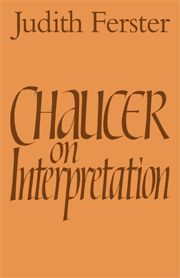Book contents
- Frontmatter
- Contents
- Preface
- 1 Introduction
- 2 Interpretation in the Knight's Tale
- 3 Reading Nature in the Parliament of Fowls
- 4 The Lady White and the White Tablet: The Book of the Duchess
- 5 Reading Griselda: The Clerk's Tale
- 6 Reading the Self: The Wife of Bath
- 7 The Politics of Narration in the Frame of the Canterbury Tales
- Notes
- Index
7 - The Politics of Narration in the Frame of the Canterbury Tales
Published online by Cambridge University Press: 04 August 2010
- Frontmatter
- Contents
- Preface
- 1 Introduction
- 2 Interpretation in the Knight's Tale
- 3 Reading Nature in the Parliament of Fowls
- 4 The Lady White and the White Tablet: The Book of the Duchess
- 5 Reading Griselda: The Clerk's Tale
- 6 Reading the Self: The Wife of Bath
- 7 The Politics of Narration in the Frame of the Canterbury Tales
- Notes
- Index
Summary
THE NARRATIVE FRAME of the Canterbury Tales is the tale about the tales. The relationships among Harry Bailly, the narrator, and the pilgrims demonstrate the themes of literary and political authority I have examined in the previous chapters. The political questions about who will lead and how decisions will be made bear upon the literary questions because at stake are the terms of the storytelling game and the order of the stories. All the negotiations and arguments concern the shape and meaning of the text (although only the narrator refers to the literary text explicitly).
As Alan T. Gaylord has pointed out, when the Host becomes master of ceremonies of the pilgrimage, he tries to commission certain kinds of tales in a certain order, and judges and interprets some of them. He is part editor, part patron, part literary critic. He is both a producer and a consumer of the text. As he stands before the pilgrims, nominating himself as leader and requesting election by acclamation, he stands for authors, especially those who perform their works orally. Like poet-performers, he must have the consent of the group in order to entertain them. But since he tells no tale of his own, he is also consumer as producer, representing the audience's power over the shape and meaning of the text. In contrast, the narrator is producer as consumer, or rather he pretends to be.
- Type
- Chapter
- Information
- Chaucer on Interpretation , pp. 139 - 156Publisher: Cambridge University PressPrint publication year: 1985



